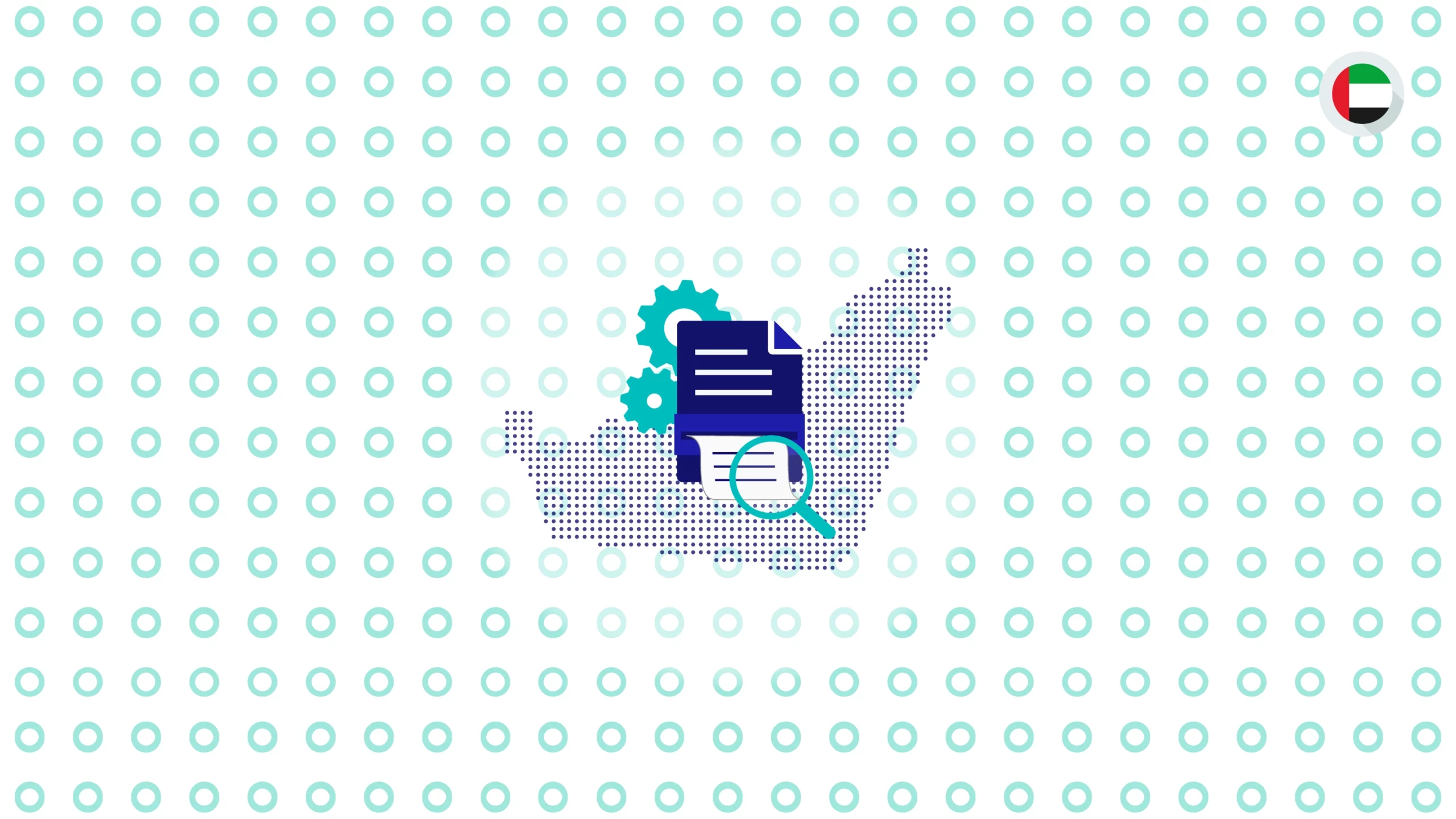UAE UBO Check Guide: Laws, Requirements, Procedures, and More
November 8, 2024
7 minutes read
- The nation’s Ministry of Economy (MoE) collected AED 65.9 million for non-compliance with AML/CFT from Designated Non-Financial Businesses and Professions (DNFBS) alone.
- A major factor in the UAE’s 2023 removal from the FATF’s grey list was its more stringent UBO laws and enforcement.
- Failing to identify and report UBOs accurately can result in fines of up to AED 1 million per violation in the UAE.
UAE follows a zero-tolerance approach for cracking down on non-compliant businesses.
In the first half of 2022 alone, the Middle Eastern country dished out AED 41 million in fines for Anti-Money Laundering (AML) non-compliance.
A significant part of AML compliance is knowing exactly who you’re doing business with – the Ultimate Beneficial Owners (UBOs).
Not so fast. Before you say, “I know who I’m doing business with,” think again.
Shady ownership looks simple on the surface, but there’s always more than meets the eye.
If your “partner” is concealing something, you’re guilty by association, and those fines can come knocking on your door, too.
With regulators breathing down everyone’s necks, skipping UBO checks is like going skydiving without checking your parachute. Sure, it might work out, but do you really want to take that risk?
If not, take aside 7 minutes (read time) for this guide.
Why UBO Checks Matter in the UAE
Simply put, UBO is any natural person who ultimately owns or controls 25% or more of a company’s shares or voting rights. But it’s not always that straightforward. Individuals who exercise control in other ways, such as the authority to choose or dismiss directors, can also be considered UBOs.
Why does this matter to you? Because identifying UBOs is a crucial part of your due diligence when setting up or expanding your business in the UAE.
UAE Laws on UBO Disclosure
The UAE’s UBO laws have continuously improved. Federal Decree-Law No. 20 of 2018 on Anti-Money Laundering serves as the core, although regulations are always improving. This rule requires businesses to identify and reveal their ultimate beneficial owners or the individuals who truly control or run the company.
In 2023, the government introduced Cabinet Decision No. 109, replacing the previous Cabinet Decision No. 58 of 2020. This update refined the procedures for managing beneficial ownership information, including how it’s collected, verified, and reported to authorities.
But here’s where it gets interesting – and potentially costly. Penalties for non-compliance were outlined in Cabinet Resolution No. 132 of 2023.
Believe it or not, you don’t want to find yourself on the wrong side of these regulations. Keep reading; you will find the consequences of non-compliance in the latter half. But before that, let’s take a look at the requirements.
UBO Requirements for Different Business Types
The requirements vary slightly depending on your business structure:
- If you’re setting up a mainland company, you’ll need to register UBO information with the relevant licensing authority, such as the Department of Economic Development.
- Free zone entities must comply with their specific free zone authority’s requirements.
- Offshore companies need to report to the offshore registrar and meet international standards.
Regardless of your structure, you’ll need to maintain a UBO register at your company’s main office and report any changes promptly. And if you’re using nominee directors or shareholders? They need to be identified too.
The UAE is aligning itself with international best practices, such as the Financial Action Task Force’s (FATF) recommendations. As a direct result of its efforts in this area, the UAE was removed from the FATF’s grey list in 2023, demonstrating its dedication to financial integrity.
How to Conduct UBO Checks: Step By Step
Now that we’ve set the stage, let’s get into the practical side of UBO checks. Think of this as your roadmap to compliance – and peace of mind.
Step 1: Gather Your Documents
You’ll need to collect a suite of documents. This includes:
- Articles of incorporation
- Memorandum of association
- Trade license
- Shareholder register
- Organizational structure charts
Don’t forget personal identification documents for potential UBOs, such as passport copies and proof of address. Yes, it’s a lot of paperwork, but it’s worth the effort.
Step 2: Analyze the Ownership Structure
This is where things can get tricky. You’re not just looking for direct owners with 25%+ ownership. You need to trace ownership through multiple corporate layers.
Also, control isn’t just about share ownership. Look for:
- Voting rights
- Contractual arrangements
- Power to appoint or remove directors
Step 3: Verify, Verify, Verify
Got your list of potential UBOs? Great. Now it’s time to verify. Cross-reference with official databases. For UAE residents, the UAE Pass system can be a goldmine of information.
If something smells fishy, don’t be afraid to dig deeper. Request additional documentation. Ask for clarification.
Step 4: Update Regularly
You need to stay on top of changes. Set up a system for regular reviews – at least annually, or whenever there’s a whisper of change in ownership or control.
Step 5: Document Everything
Maintain that UBO register like your business depends on it – because it does. Keep it up to date, formatted correctly, and readily available for when the authorities come knocking.
When Things Get Complicated
Sometimes, identifying UBOs is about as straightforward as untangling a ball of yarn that a cat’s been playing with. Here are some tricky scenarios you might encounter:
- Multi-layered corporate structures: Keep peeling that onion until you get to the core.
- No clear 25% UBO: In this case, you might need to identify senior managing officials as alternative UBOs.
- Nominee shareholders and bearer shares: These can be red flags. Dig deep to find the true beneficial owners.
Consequences of Non-Compliance
Non-compliance with UBO regulations in the UAE can have severe repercussions for your business. Financial penalties are tiered based on violation severity, ranging from AED 50,000 for minor infractions to AED 1 million or more for serious breaches. These fines, however, are just the tip of the iceberg.
Your business could face operational restrictions, including the suspension or revocation of your trade license. This could effectively halt your UAE operations, causing significant financial losses.
Perhaps more damaging is the potential hit to your reputation. In the UAE’s close-knit business community, a reputation for non-compliance can lead to lost partnerships and missed opportunities.
Moreover, non-compliance puts you under increased regulatory scrutiny, meaning more frequent audits and inspections. Each of these carries the risk of uncovering further issues and additional penalties.
Using Technology for UBO Checks
Here’s some good news – technology is making UBO checks easier and more accurate.
AI and machine learning can help you understand complex ownership structures. Blockchain technology is revolutionizing how UBO information is stored and shared.
Consider integrating UBO checks with your existing AML/KYC systems. Look into digital ID verification systems and automated sanctions screening tools.
Yes, there are challenges – data privacy concerns and adoption costs, to name a few. But the benefits in terms of accuracy and efficiency are hard to ignore.
We know that adapting to new technologies for UBO checks can feel overwhelming. You’re not alone in this. Many business leaders find themselves in the same position, trying to balance compliance with efficiency.
At Signzy, we’ve developed a UBO API specifically designed to address these challenges. Our API streamlines the process of identifying and verifying ultimate beneficial owners, helping you understand complex ownership structures with greater ease and accuracy.
FAQs
- How often do I need to update my company’s UBO information?
You should update your UBO information annually or whenever there’s a change in ownership or control. Promptly report any changes to the relevant authorities to maintain compliance.
- What if my company doesn’t have a single individual owning 25% or more?
If no individual meets the 25% threshold, identify the senior managing officials as the UBOs. This typically includes directors or C-level executives with significant control over the company.
- Are there any exemptions from UBO reporting in the UAE?
Yes, companies listed on recognized stock exchanges and their wholly-owned subsidiaries are generally exempt from UBO reporting. However, always check with a legal advisor for your specific situation.
- How can I verify the UBO information provided by my business partners?
Use official databases, request certified documents, and consider using professional due diligence services. Cross-reference information from multiple sources to ensure accuracy. Or alternatively, you can use solutions like Signzy.
- What should I do if I suspect a violation of UBO regulations?
Report your suspicions to the Financial Intelligence Unit (FIU) immediately. Maintain confidentiality and don’t tip off the suspected party. Consult with a legal expert for guidance.













